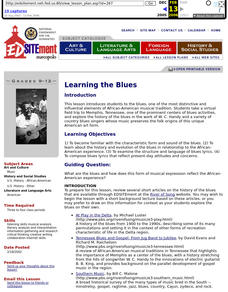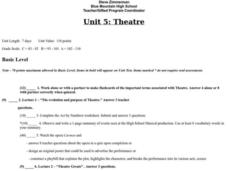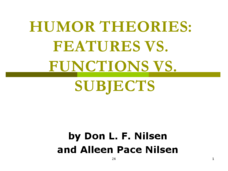Curated OER
Can You Beat Jet Lag?
Students examine the health condition of jet lag. Using mealworms, they test the effect of light on the development of them into adults. They answer discussion questions and examine the relationship of age and one's activity level.
Curated OER
Learning the Blues
Students become familiar with the characteristic form and sound of the blues, then learn about the history and evolution of the blues in relationship to the African-American experience. Students examine the structure and language of...
The New York Times
Super Brand
Children can recognize popular brands from an early age, but these images symbolize much more than what they advertise. Take a journey through the design of a logo with a lesson that focuses on the history and ubiquity of the Super Bowl...
Curated OER
What is Opera?
In this opera worksheet, 8th graders read about the history and evolution of opera as a type of theatre. They answer 4 questions based on the reading using complete sentences.
Curated OER
Illuminations of the Middle Ages
Students investigate medieval music, art, and manuscripts. They research the materials and equipment used by illuminators, examine images of manuscripts, and illuminate their own initials in a medieval style.
Curated OER
Similarities Between African Folktales And French Folktales
Students study the importance of the Storyteller in ancient times as well as in modern times. They realize that this is an art essential to the development and evolution of the mind and that today more than ever we need to rely on...
Curated OER
Theatre
Students identify and create flashcards of important key terms as related to theatre. Students observe and write a 1-page summary of events seen at the High School Musical production using at least 8 vocabulary words in your summary....
Curated OER
Fun with Phylogenetic Trees
Tenth graders differentiate angiosperms and gymnosperms. In this biology lesson, 10th graders construct a musical phylogenetic tree from information they gathered on resource websites. They present their project in class.
Curated OER
One World
Students explore the urban socioeconomic and political problems in the US that caused hip hop to emerge in the 70's and 80's. Hip Hop culture is explored and related to the genre of art form.
Curated OER
Chicago Rhythms, Chicago Roots
Students view a video about different types of music. They examine the history of jazz, big band and rock back to the city of Chicago. They discover Chicago's music scene today and compare it to the past.
Curated OER
Street Language
Students consider the impact of language. In this literacy instructional activity, students read an article about literary classics being rewritten in "youth speak" (the article is not included). Students read and discuss the article.
Curated OER
Women in Jazz
Students watch a video: "VH1 Millennium Jazz Festival From The White House" to become familiar with prominent women in jazz. They discuss the vocally oriented nature of jazz and the contributions made by women on and off stage.
Louisiana Department of Education
Fahrenheit 451
In his 2013 introduction to Fahrenheit 451, Neil Gaiman states, “Fiction is a lie that tells us true things, over and over.” In this extraordinary unit plan, readers "explore the power of written language to educate and influence...
Curated OER
Humor Theories: Features vs. Functions vs. Subjects
Great for a psychology, sociology, or language arts lecture, this presentation focuses on the features, functions, and subjects of humor. Complete with definitions and examples of each category, as well as links to humorous videos and...
National Constitution Center
Creating Your Own Town Hall Poster
Middle and high schoolers are walking into a world rife with strong political viewpoints and vocal opinions. Help to prepare them for controversial discussions with a lesson in which they choose, research, and learn more about a...
Curated OER
The Star-Spangled Banner
Get your kids moving as they learn about the history of the United States National Anthem. Scholars examine the War of 1812, Francis Scott Key, and the meaning behind The Star Spangled Banner as they listen to an 18-minute...
Curated OER
GUITARS AS SCULPTURE
Students discuss guitars, pointing out different parts of the guitar, compare/contrast guitars from different times, imagine they are designers hired to build a new age guitar, create many preliminary sketches, choose one, and begin...
Curated OER
Jackie Steals Home
Students read articles relating to Jackie Robinson's breaking of the racial barrier in professional baseball. This leads to a deeper exploration of racism in the United States. They use a variety of worksheets imbedded in this plan to...
Curated OER
Cotton And Child Labor
Eleventh graders investigate the practice of child labor as found in the history of the United States. The teacher reads the class a story from the year of 1914. This creates context for the lesson and then students answer teacher...
Curated OER
Art Nouveau
Students study the design elements of Art Nouveau, its sources and development. They create art projects in ceramics and glass that exemplify the focus of Art Nouveau as a decorative style.
Curated OER
Hispanics in Indianapolis
Eighth graders explore the history of the Indianapolis Hispanic Community and create an illustrated timeline of Hispanics in Indianapolis beginning from 1870 and ending in 1999, while exploring local social issues of the past and present.






















